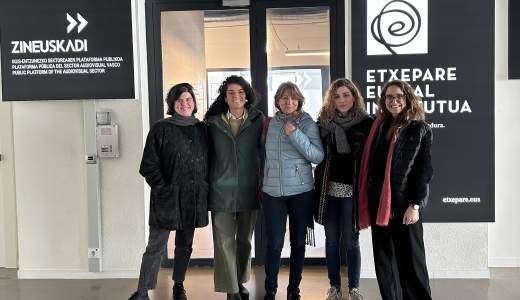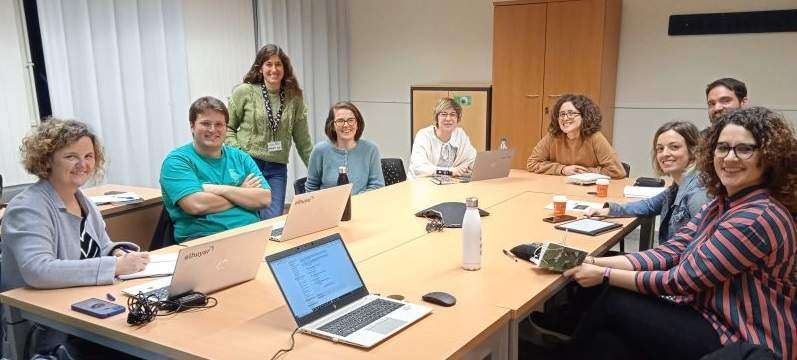Klara Ceberio of Elhuyar and Elizabete Manterola of the Tralima-itzulik research group in the Faculty of Letters at the UPV/EHU, tell us about the project funded by the KSIgune Connections 2023/24 programme. With this research they aim to contribute to building fairer societies from the sphere of the language industry.
KSIgune: Your project focuses on the impact of machine translation on language quality, specifically on the language bias these systems generate. What do you think is the scale or importance of this problem at present?
Klara Ceberio / Elizabete Manterola: We are now in the era of artificial intelligence and machine translation is one of the technologies that has advanced the most in recent years. The use of this technology has spread through much of society and as its use grows, the quality of the results of machine translation has become a cause for concern. Gender bias is a habitual problem in the machine translation field. As these tools learn from examples, the algorithms learn and repeat existing biases and stereotypes in texts and therefore run the risk of perpetuating them. This problem is even more evident when translating from languages where there is no grammatical gender, for example from Basque to Spanish.
Concern regarding bias in artificial intelligence systems is widespread among the research community, especially in technology, a highlight being the work of Corral and Aralegi (2022), who researched and developed an innovative technique to reduce gender bias in machine translation.
KSIgune: In response to this problem, you propose to analyse the gender bias that arises in the results of machine translation between Basque and Spanish. How do you approach this challenge in your project?
Klara Ceberio / Elizabete Manterola: We are establishing criteria for analysing gender bias and we will analyse translations of texts created using machine translation.
To do this, in order to ensure textual diversity, texts from different areas were used. Firstly, sample texts were chosen in the literary and narrative sphere; secondly, in the field of journalism, texts from Berria newspaper were used, and finally scientific dissemination texts were used, to analyse how machine translation works with all of them.
To analyse and assess issues related to gender bias efficiently, we usually started out from lists of words that can be related to female and male stereotypes. For example, there are adjectives often associated with female stereotypes (pretty and so on), while others are associated with male stereotypes (strong, brave and so on).
Something similar happens with occupations, so our aim is to review the jobs traditionally done by men and women. For example, those often associated with men: mechanics, entrepreneurs, surgeons...; and those associated with women: secretaries, cleaners, carers, nurses...
We are analysing how machine translation deals with these words and assessing the results, with the aim of improving machine translation systems in the future.
KSIgune: What results do you expect to achieve from your research in response to the social and digital/technological challenges faced in the language industry?
Klara Ceberio / Elizabete Manterola: The results we gain from this research will serve for gender bias to be taken into account in the future development of technologies based on artificial intelligence and to develop more egalitarian algorithms.
Moreover, up to now most research has been undertaken from a technological standpoint, but we believe it is essential to explore this topic from a linguistic point of view, as to improve the results we feel a more profound analysis of language is required.
KSIgune: Six female researchers and one male researcher will be taking part in this project. What features will this largely female viewpoint bring to the project?
Klara Ceberio / Elizabete Manterola: Of course, a diversity of viewpoints enriches the project, not just because the work group is largely women, but also because of the link it proposes between university and business and the mixture of different points of view: that of language-related and technology-related research. In business we are using technologies and resources created by Elhuyar and made available to society to conduct language-related research.
KSIgune: How do you think it will help you to be part of ‘KSIgune Connections’? How do you think we can go on valuing, as a community, the work of women researchers in the field of the cultural and creative industries (CCIs)?
Klara Ceberio / Elizabete Manterola: Being part of KSIgune Connections offers us a unique opportunity to work with industry and university. We believe collaboration between institutions like the university and Elhuyar is essential to progress in research and development. In this case we have also had the chance to combine two areas of study that have traditionally been female and male-dominated respectively, as we have exploited knowledge in the translation field to analyse the results of technology based on artificial intelligence.
Like this, from a linguistic point of view, we wanted to emphasise the path towards equality, by putting the knowledge and research built up at the university to real use.
Finally, this project has helped us to set up a multi-disciplinary work group to carry out projects of this kind that are not fostered in other environments.
More information
To learn more about the projects of the KSIgune Connections 2023/24 call, go to the section Connections.
Current issues related news
-

Tailor-made innovation for the arts, culture and creativity
ksiGuneIn 2025, KSIgune promoted a boot camp, two training and research calls, and a sectoral meeting, supporting 10 new collaboration initiatives to bring innovation to businesses and make an impact on the…
-

Konexioak 2025: your chance to create and make an impact
ksiGuneIf you study, research or work contributing to the advancement of the Arts, Culture and creative disciplines such as Architecture, Fashion or Gastronomy in the Basque Country, and you want to become…
-

Women in animation: Residency of the Euroregional Green Audiovisual Hub
ksiGuneFrom 3 to 21 March, the scriptwriters Laura Ibáñez, Esther Vital and Marion Moreau took part in the Euroregional support programme to continue the development of their audiovisual projects in…

